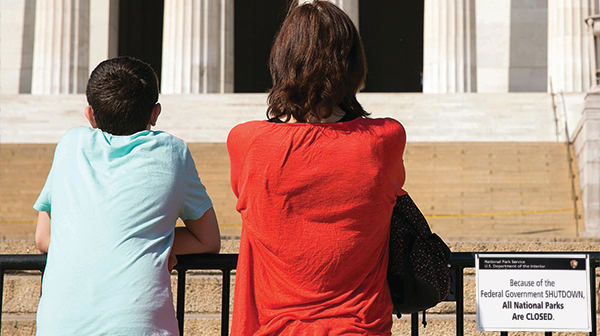
Review of events that led to the shutdown in October 2013, who’s to blame, and how emergency physicians can make the political system better
Explore This Issue
ACEP Now: Vol 33 – No 02 – February 2014The absence of government is chaos. So welcome to Washington, DC! While the U.S. Congress has previously demonstrated its unique ability to shirk its collective duty to lead our country, “Washington”—and I’ll include the president on this one—went above and beyond during the October 2013 shutdown of the federal government. Given that one of the fundamental responsibilities of Congress is to approve a budget by which the federal government is allowed to operate, it is not a stretch to say that Congress failed to earn its paycheck, which, of course, its members continued to collect, despite the furlough of thousands of other federal employees (who eventually got paid for not working). This shutdown was the third longest in the history of the country, after the 18-day shutdown in 1978 and the 21-day shutdown in 1995–1996. That tells you how truly dysfunctional things have to get for this to happen. Why the shutdown happened is, however, more about some of the fundamental challenge of politics in our nation, not just in Washington, and doesn’t bode well for the future of our country.
The details are not pretty. The federal government shutdown that lasted for 16 days in October is estimated to have cost the U.S. economy between $2 billion and $6 billion in economic output, according to a report by the Office of Management and Budget (OMB) and independent financial analysts. Approximately 120,000 fewer private-sector jobs were created during the first two weeks of October because of the dual threats of the shutdown and the standoff over the debt ceiling. Federal employees were furloughed during the shutdown for a combined total of 6.6 million days, and they received $2 billion in back pay for work they never performed. This exceeds the comparable payroll costs of $430 million (about $650 million in today’s dollars) for the November 1995 shutdown and $630 million (about $1 billion in today’s dollars) for the December 1995–January 1996 shutdown. The country’s national parks lost roughly $500 million in visitor spending nationwide, while almost $4 billion in tax refunds was delayed because the Internal Revenue Service was closed for business.
The details of the shutdown are not pretty. The federal government shutdown that lasted for 16 days in October is estimated to have cost the U.S. economy between $2 billion and $6 billion in economic output.
So why did the shutdown happen? The easy answer is “politics,” but that really doesn’t tell the whole story. We all know that Republicans and Democrats have differing views of the role of the federal government. Republicans want smaller government and less spending on entitlement programs, while Democrats believe in a bigger role for government with spending on programs to help individuals. There are philosophical differences between the two parties, not exactly earth-shattering news. While these differences may seem irreconcilable, the reality is that there have always been parties with philosophical differences running the country. Heck, short of a few years here and there when one party has held a majority in the U.S. House and Senate and had the president in the White House, this is the norm. And yet, the government doesn’t shut down every year. Historically, despite the division of authority granted by the people, the government has actually managed to get some things done. Can you imagine if the founders of this nation simply “took their ball” and went home every time they philosophically disagreed on the role of government? I’ll tell you what would have happened—nothing! Thomas Jefferson and the founders of the country would have just agreed to disagree, and you and I would be having tea and crumpets (whatever they are) and singing “God Save the Queen” at every sporting event we attend. Why is it that the functioning of the government has become more dysfunctional over the past few years?
Pages: 1 2 3 4 | Single Page





No Responses to “The U.S. Federal Government Shutdown Doesn’t Bode Well for Our Future”